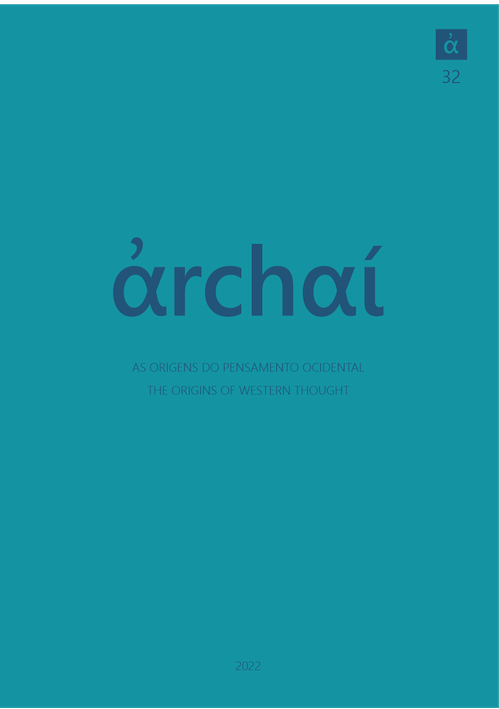Irony and refutation: the elenchos of Callicles in Plato ́s Gorgias
DOI:
https://doi.org/10.14195/1984-249X_32_11Keywords:
Elenchos, Irony, Socrates, Callicles, PoliticsAbstract
In this work I use the concept of irony to analyze the elenchos that Socrates practices on the opinions of Callicles in the Gorgias. I assume as a starting point that Socrates aims at the modification of his interlocutor ́s animic disposition, adopting a philosophical way of life and abandoning the rhetorical one. To do this, he develops an ironic elenchos that has three moments: a feigned acceptance by Socrates of the dichotomy presented by Callicles between the life of the politician, worthy of imitation, and that of the philosopher, worthy of reproach; a reversal of that dichotomy; and finally, a questioning of that reversal. I will conclude by arguing that this third moment constitutes a new Socratic maneuver to urge Callicles to suspend his political activities, and previously examine philosophically with him the way to become virtuous.
Downloads
References
BIEDA, E. (2014). Elenchos, intelectualismo y vergüenza en el Gorgias de Platón. Archai, n. 14, p. 77-91.
BRICKHOUSE, T. C.; SMITH, N. D. (2002). The Socratic Elenchos? In: SCOTT, G. A. (ed.). Does Socrates have a Method? Pennsylvania, The Pennsylvania State University Press, p. 145-157.
BURNET, J. (1903). Platonis Opera. Tomus III. Oxford, Clarendon Press.
CALONGE RUIZ, J. (1983). Platón. Gorgias. Madrid, Gredos.
CARPENTER, M.; POLANSKI, R: M. (2002). Varieti of Socratic Elenchi In: SCOTT, G. A. (ed.). Does Socrates have a Method? Pennsylvania, The Pennsylvania State University Press, p. 89-100.
DIXSAUT, M. (2000) Platon et la question de la pensée. Etudes platoniciennes I. Paris, Librairie Philosophiqeu J. Vrin.
DODDS, E. R. (1959). Plato. Gorgias. Oxford, Clarendon Press.
EDMONDS, R. G. (2012). Whip Scars on the Naked Soul: Myth and Elenchos in Plato´s Gorgias. In: COLLOBERT, C.; DESTRÉE, P.; GONZÁLEZ, F. (eds.). Plato anf Myth. Leiden, Brill, p. 165-186.
GRISWOLD, C. (2002). Irony in the Platonic Dialogues. Philosophy and Literature, n. 26, p. 84-106.
IRWIN, T. (1979). Plato. Gorgias. Oxford, Clarendon Press.
KLOSKO, G. (1983). The Insufficiency of Reason in Plato´s Gorgias. Political Research Quarterly, n. 36, p. 579-595.
LANE, M. (2011). Reconsidering Socratic Irony. In: MORRISON, D. R. (ed.). The Cambridge Companion to Socrates. Cambridge, University Press, p. 237-259.
McCABE, M. M. (2007). Irony in the Soul: shoul Plato´s Socrates be Sincere? In: TRAPP, M. (ed.). Socrates from Antiquity to the Enligthenment, London, Routledge, p. 17-32.
NATHAN, A. R: (2020). Plato´s Use of Irony. A Thesis for the Degree of Doctor in Philosophy. The University of Sidney.
NEHAMAS, A. (1998). The Art of Living: Socratic Reflexions from Plato to Foucault. Berkeley, University of California Press.
PLOCHMANN, G. K.; ROBINSON, F. E. (1988). A friendly Companion to Plato´s Gorgias. Carbondale and Edwardsville, Southern Illinois University Press.
ROBINSON, R. (1941). Plato´s Earlier Dialectic. Ithaca. New York, Cornell University Press.
ROWE, C. (1987). Platonic Irony. Nova Tellus, v. 5, p. 83-101.
STAUFFER, A. (2006). The Unity of Plato´s Gorgias. Rethoric, Justice and the Philosophic Life. Austin, The University of Texas.
TARNOPOLSKY, C. H. (2010). Prudes, Perverts and Tyrants. Plato´s Gorgias and the Politics of Shame. Princeton, University Press.
VLASTOS (1987). Socratic irony. The Classical Quarterly, v. 37, n. 1, p. 79-96.
VLASTOS (1983). The Socratic elenchus. Oxford Studies in Ancient Philosophy, 1, p. 27-58.
WOLFSDORF, D. (2007). The Irony of Socrates. The Journal of Aesthetics and Art Criticism, n. 65, p. 176-187.
Downloads
Published
How to Cite
Issue
Section
License
Copyright (c) 2022 Martín Forciniti

This work is licensed under a Creative Commons Attribution 4.0 International License.
Given the public access policy of the journal, the use of the published texts is free, with the obligation of recognizing the original authorship and the first publication in this journal. The authors of the published contributions are entirely and exclusively responsible for their contents.
1. The authors authorize the publication of the article in this journal.
2. The authors guarantee that the contribution is original, and take full responsibility for its content in case of impugnation by third parties.
3. The authors guarantee that the contribution is not under evaluation in another journal.
4. The authors keep the copyright and convey to the journal the right of first publication, the work being licensed under a Creative Commons Attribution License-BY.
5. The authors are allowed and stimulated to publicize and distribute their work on-line after the publication in the journal.
6. The authors of the approved works authorize the journal to distribute their content, after publication, for reproduction in content indexes, virtual libraries and similars.
7. The editors reserve the right to make adjustments to the text and to adequate the article to the editorial rules of the journal.



